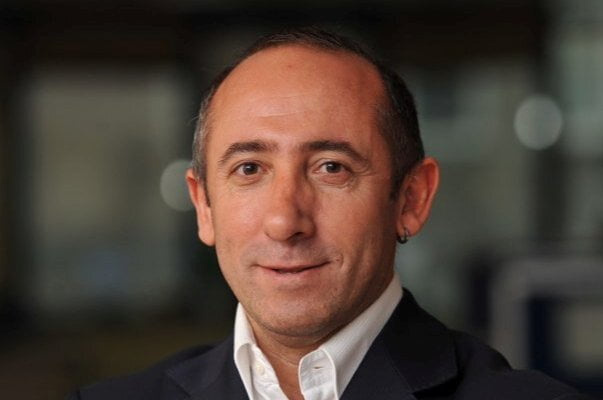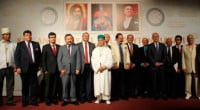I object to AK Party’s ‘New Turkey’

Date posted: February 11, 2014
The Dec. 17 process has turned into a useful excuse in which these writers blame the movement for everything and enjoy peace and comfort by defending the government. If only soul-searching were so superficial…
Let us assume that they exonerated themselves by self-criticism. What should we do then?
What word would explain the state of affairs of those who try to understand the conservative world from an insider’s perspective, fight for rights and freedom, and politically supported the Justice and Development Party (AK Party) in their normalization efforts? I don’t know what word is useful to describe us, but it is obviously not “being trapped.”
It is too simplistic to explain the critical stance of those who, up until recently, have been close to the AK Party and their opposition of the AK Party and Prime Minister Recep Tayyip Erdoğan because of their inability to influence AK Party policies because none of these arguments require effort. All are very simplistic explanations.
None of the criticisms by those who have been unable to raise a critical voice against the AK Party and its policies, particularly since 2011 vis-à-vis those who would do so, is significant.
Social restoration
At this point, let us note something. Today, the major problem of the AK Party is its agenda and social imagination, which has been changing since 2011. Sadly, this imagination is no longer a democratic, secular and pluralistic Turkey. This is the main issue. The change the AK Party has been going through over the last two years in its political discourse and preferences is extremely different from what the prime minister portrayed eight years ago.
In a group meeting on Oct. 11, 2006, Prime Minister Erdoğan said: “Aren’t there threats to the future of the country and the values of the republican regime? Of course there are, but let us not forget that these are marginal and not representative of society as a whole and that these threats can be handled by full compliance with the law. In the final analysis, these extremists are also our people. We are saying that it is our common duty to attract them to the center. We have to ensure agreement over common denominators. We should heal wounds. We see the future as a social restoration period that will strengthen social peace and cohesion. Without looking at ethnic, religious, sectarian, ideological or cultural differences and without making any distinction between men and women, we need to create a new common ground of agreement that will embrace all social groups and parties.”
Undoubtedly, these remarks were significant in embracing society as a whole. Unfortunately, this goal has not yet been achieved, despite the AK Party receiving 47 percent of the vote in 2007 and 50 percent in 2011.
At this point, we need to state that the third term in office which the prime minister refers to as the period of mastery appears to be a goal of converting society through a single cultural identity rather than a period of restoration that will strengthen social peace.
I am not sure how meaningful a reference this is but a statement by İstanbul party chair Aziz Babuşçu on March 31, 2013, was a lapsus from a Freudian perspective.
Babuşçu had said: “Those who have been our partners over the past decade during our terms in office will not be our stakeholders in the next decade because, over the past decade, there were stakeholders in the actions we performed in the fields of freedom, law and justice. Even though they were not very fond of us, liberal circles and others supported us in this process anyway. However, the future is a period of construction. The period of construction will not be one which they will be pleased by. Therefore, these stakeholders will not be with us. Those who were with us in the past will be with our opponents in the future because there will be no future or period which they will accept. This is why our job will become really hard from now on.”
These remarks were made in 2013 and were consistent with the policies that the AK Party pursued between 2011 and 2013.
The construction of a unique cultural identity by the AK Party, which started with the nomination of the candidates for the 2011 elections, was not limited to intra-party consolidation. It also attempted to design every area where it was present in political terms with its own identity. Plurality was replaced by a single identity; diverse identities were repressed in the public sphere. Special criteria were observed in the recruitment of new people in public positions. This period was also an era in which the AK Party became alienated. Attempts to overcome this alienation by public communication tools and state power failed.
In sum, the AK Party, which, in the macro sphere, conveyed politics from the state to society, normalized Turkey, promoted civilianization and made itself a center party, started using the language of a conservative/right-wing political party since 2011 rather than a center party that relies on a lenient and moderate discourse in the micro sphere.
Its discourses and practices on a wide range of issues, including women’s issues, youth problems, birth control, the number of children that parents should have, alcohol consumption and freedom of thought and expression are not pro-freedom; rather, its discourse and language in this sphere is pretty conservative.
What happened in the Gezi process, the discussions over prep schools and the judicial and bureaucratic developments in the aftermath of the bribery and corruption investigation are clear indicators of this political tendency of the AK Party which seeks to purge the entire public sphere. And it is trying to do so by relying on state power.
From Gezi to Dec. 17: From conspiracy to parallel state
In the Gezi protests, the AK Party lost its supporters who played a role in the 2010 referendum. But this was not important for the AK Party. Babuşçu had said this three months before the Gezi incidents.
During the Gezi process, the prime minister tried to consolidate his support base by relying on a discourse of “50 percent.” From this perspective, this discourse was a state of politicization that preferred polarization.
The most concrete step of the AK Party’s 2023 vision appears to be its plans for prep schools. The first sign of this approach was made by Prime Minister Erdoğan, who said they would raise a religious generation. His remark in a party meeting on Jan. 31, 2012, that they would work to raise a religious generation is pretty significant from this perspective.
The transformation in high schools in the aftermath of the introduction of a new practice in the education system, which has generated serious discussions, is rather important. Via this process of transformation, most general high schools were converted into specialized high schools. After this transformation, the number of religious schools systematically and dramatically increased. Let us assume that this was a deliberate political preference and choice as part of the dream of an ideal society. Many students had to go to these schools despite the fact that they did not even choose to.
This process was followed by discussions over shutting down prep schools, which the government argued has been under the spotlight since 2009. This step showed that the AK Party did not only want secular circles and actors but also religious communities in the public sphere. We have all observed the developments in the bureaucracy and the judiciary in the aftermath of the Dec. 17 investigation, which remind us of a witch hunt.
The AK Party viewed the investigations into the corruption and bribery allegations on Dec. 17 as a coup attempt against its government. And previous plans were immediately implemented. The problem with these plans was that no substantial reason was referred to in this process.
The elements of guardianship within the state, if any exist, should be purged but this should be done by relying on the law. The discourse that guardianship was established in the judiciary and bureaucracy is not convincing because, up until recently, the AK Party was part of such a guardianship.
Symphony of loneliness
The AK Party, which parted ways with a small group in the Gezi process, now did the same with the Hizmet movement in the aftermath of Dec. 17.
At this point, the number of votes which the movement holds is not important because the problem we are dealing with right now is not the votes which the AK Party will receive in the local and general elections. The problem is that there is a Turkey based on a single identity whose conservative/right-wing tone is more apparent rather than a pluralist vision.
The problem we are dealing with is the AK Party’s attempt to homogenize society and rule the country with an awkward form of a presidential system. The problem is the emergence of an authoritarian single-party approach based on patriarchal tendencies.
And as such, I do not feel caged or trapped as a person who remains outside the conservative world. The only thing that I feel is that I need to keep objecting to what is happening as long as I am able to write and express my views because the AK Party’s new Turkey is extremely different from the one I have been dreaming of.
And finally, we need to ask this question: What changed the AK Party’s political choices in 2011? There are two answers to this question, which will be explored in further detail in future columns: the temptation of the Arab awakening and the deadlock in the Syrian crisis.
Source: Todays Zaman , February 11, 2014
Tags: Defamation of Hizmet | Democracy | Freedoms | Hizmet (Gulen) movement | Turkey |
























